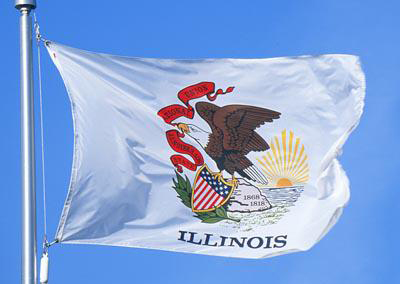Pages: << 1 ... 91 92 93 94 95 96 97 98 99 100 101 ... 1327 >>
Saving Illinois: Getting More Bang for the State’s Bucks
Ellen Brown
Illinois is teetering on bankruptcy and other states are not far behind, largely due to unfunded pension liabilities; but there are solutions. The Federal Reserve could do a round of “QE for Munis.” Or the state could turn its sizable pension fund into a self-sustaining public bank.
Illinois is insolvent, unable to pay its bills. According to Moody’s, the state has $15 billion in unpaid bills and $251 billion in unfunded liabilities. Of these, $119 billion are tied to shortfalls in the state’s pension program. On July 6, 2017, for the first time in two years, the state finally passed a budget, after lawmakers overrode the governor’s veto on raising taxes. But they used massive tax hikes to do it – a 32% increase in state income taxes and 33% increase in state corporate taxes – and still Illinois’ new budget generates only $5 billion, not nearly enough to cover its $15 billion deficit.
Adding to its budget woes, the state is being considered by Moody’s for a credit downgrade, which means its borrowing costs could shoot up. Several other states are in nearly as bad shape, with Kentucky, New Jersey, Arizona and Connecticut topping the list. U.S. public pensions are underfunded by at least $1.8 trillion and probably more, according to expert estimates. They are paying out more than they are taking in, and they are falling short on their projected returns. Most funds aim for about a 7.5% return, but they barely made 1.5% last year.
Fake News Alleging Second Putin/Trump Meeting at G20
Stephen Lendman (stephenlendman.org (Home - Stephen Lendman)
Media scoundrels are all over this story, misreporting what happened.
A White House statement called an alleged second meeting “false, malicious and absurd.”
Trump tweeted: “The Fake News is becoming more and more dishonest! Even a dinner arranged for top 20 leaders in Germany is made to look sinister!”
“Fake News story of secret dinner with Putin is ‘sick.’ All G 20 leaders, and spouses, were invited by the Chancellor of Germany. Press knew!”
NYT fake news said the following:“(T)here was another (Putin/Trump) encounter (at the G20): a one-on-one discussion over dinner that lasted as long as an hour and relied solely on a Kremlin-provided interpreter.”
Do You Think the U.S. Won't Have A New Financial Collapse Soon?
Executive Intelligence Reiew
July 17, 2017 (EIRNS) -- Signs of growing defaults are showing across the range of ultimately unpayable debt bubbles in the United States economy, while underlying economic growth continues in the crater of a 1.5% nominal GDP annual rate.
The July 17 {Wall Street Journal} featured a report of an "unheard of event" -- a Houston-based private equity fund once "worth" more than $2 billion, is now worth zero. Even following the report in the July 11 {Houston Chronicle} that defaults throughout Texas corporations are shooting up and exceed even 2009 economic collapse levels, securities funds of this size losing all their value remains "unheard of"; 25% maximum losses are typical when large PE funds go bust. Yet, the {Journal} quotes one expert, "several other energy-focused funds are in danger of doing so." Big losers in the evaporation of $2.1 billion EnerVest Ltd include Canada's second-largest pension fund, the Teamsters Western Conference Pension Fund; various high-roller charitable foundations like Getty Trust, MacArthur Foundation; and Wells Fargo bank, which loaned EnerVest Ltd. $1.3 billion to leverage its investments in oil securities.
Trumpcare Closer to Demise
Stephen Lendman (stephenlendman.org (Home - Stephen Lendman)
Earlier articles explained it’s not a healthcare plan. It deceptively claims to be what it’s not.
Combined with Trump’s tax cut scheme, it’s a colossal scam to transfer trillions more dollars of wealth than already from most Americans to business and high net-worth households.
Four GOP senators along with 48 undemocratic Democrats rejected the so-called Better Care Reconciliation Act of 2017 (BCRA), preventing Republican Majority Leader Mitch McConnell from getting a floor vote he sought.
The GOP plan to repeal and replace Obamacare is dead in its current form. So is repeal alone as things now stand.
Responsible Healthcare Reform Needed
Stephen Lendman (stephenlendman.org (Home - Stephen Lendman)
Irresponsible Trumpcare couldn’t muster enough support for Senate passage.
What’s next is unclear. What’s needed is indisputable. Expecting anything positive from Congress is living in a fantasy world.
Bipartisan complicity against the general welfare is longstanding, serving privileged interests exclusively.
According to Americans for Tax Justice (ATJ), the nation’s eight largest insurance companies would get a $72 billion tax cut windfall over the next decade under Trumpcare. They’d get “nearly half of the $145 billion 10-year tax cut for the entire insurance industry (as) estimated by the Joint Committee on Taxation,” said ATJ.
According to ATJ’s executive director Frank Clemente, “(i)t’s appalling that Republicans in Congress would yank healthcare from 20 million people and give insurance companies a $72 billion tax cut.”
Trumpcare on Life Support
Stephen Lendman (stephenlendman.org (Home - Stephen Lendman)
The House version barely passed, heavy pressure enabling passage after initially failing.
As of Monday, four GOP senators joined all 48 undemocratic Democrats, rejecting the misnamed Better Care Reconciliation Act of 2017 (BCRA).
Republicans need 50 Senate votes plus Vice President Pence’s tie-breaker for passage. With four GOP defectors, they lack it. Trumpcare isn’t dead. It’s on life support close to it. Earlier, GOP Senators Rand Paul and Susan Collins expressed opposition to the Senate version - for different reasons.
POLL: Americans’ Massive Disapproval of Both Parties
Eric Zuesse
The “Monthly Harvard-Harris Poll: June 2017” is the latest poll in that series, and it scientifically sampled 2,258 U.S. registered voters, of whom (as shown on page 30) 35% were “Democrat,” 29% were “Republican,” and 30% were “independent”). It indicates (page 24) that 37% “approve” and 63% “disapprove” of “the way the Republican Party is handling its job.” It also indicates (page 25) that 38% “approve,” and 62% “disapprove,” of “the way the Democratic Party is handling its job.” So: despite there being 6% more self-described “Democrat”s than “Republican”s, there was only 1% more disapproval of the Republican Party than of the Democratic Party; and, this indicates that there was a substantial disapproval of “the Democratic Party” by Democratic voters (more disaffection by them for ‘their’ Party, than by Republicans for theirs).
The answers to other questions in the poll also help to answer why this is so, and why the voting public don’t hold either Party in high regard — why America’s supposedly ‘democratic’ (small-“D”) politics is currently a contest between uglies, with neither Party offering anything like what the U.S. voting public want their government to do (i.e., it fits what this scientific study — linked there — found actually to control U.S. politics):
US Intends New Illegal Sanctions on China
Stephen Lendman (stephenlendman.org (Home - Stephen Lendman)
Longstanding US hostility toward North Korea is unrelenting, outreach and diplomacy to resolve differences rejected.
Beijing, Moscow and Seoul want instability and belligerence on the Korean peninsula avoided. They oppose strangling the DPRK economically and financially.
The Trump administration has other ideas. New Treasury Department sanctions are being prepared, targeting Chinese banks and companies doing business with Pyongyang.
The White House intends trying to cut off cash flow to North Korea, including by targeting offshore US dollar accounts associated with companies linked to Chinese national Chi Yungpeng.
A US draft Security Council resolution intended to make the DPRK’s economy scream was prepared to be voted on in the coming days, the measure unacceptable to China and Russia.
Reckless US Policy Toward North Korea
Stephen Lendman (stephenlendman.org (Home - Stephen Lendman)
Decades of US hostility toward the DPRK created heightened tensions, threatening possible conflict on the Korean peninsula - an unthinkable prospect pitting two nuclear powers against each other if launched.
Pyongyang, China, Russia, and South Korea want issues resolved diplomatically. Washington needs enemies to justify its unjustifiable imperial agenda, North Korea a longstanding one - because of its sovereign independence, not for any threat it poses. It never attacked another country throughout its entire post-WW II history. It threatens none now, except in retaliation if attacked, its right under international law.
China is displeased with Trump administration pressure to ally with its unacceptable strategy - economic and financial strangulation to bring the DPRK to its knees, a lunatic scheme Beijing rejects, an unworkable one if implemented.
The only way to resolve Korean peninsula issues is the diplomatic road Washington won’t take. That’s the key issue, no other.
Ripoff Trumpcare and Tax Cut Schemes
Stephen Lendman (stephenlendman.org (Home - Stephen Lendman)
Both Trump plans are schemes to transfer enormous amounts of wealth from ordinary Americans to business and high-net-worth households.
That’s what they’re all about. His health plan has nothing to do with providing affordable coverage for all Americans - just the opposite, nothing to curb spiraling out-of-control costs, nothing providing “great healthcare…in a much simplified form…much less expensive and much better,” as he promised. On July 12, the Tax Policy Center (TPC) headlined “A Tax Plan Consistent With Trump’s April Outline Could Cut Revenue By Up To $7.8 Trillion.”
Including tax increases candidate Trump suggested, $3.5 trillion over 10 years would be lost. Tax cuts he proposes are “highly regressive,” said the TPC.
Business and high-net-worth households would benefit hugely. One in five household would pay higher taxes than currently - “if a half-dozen tax hikes are included in a revenue package.”











